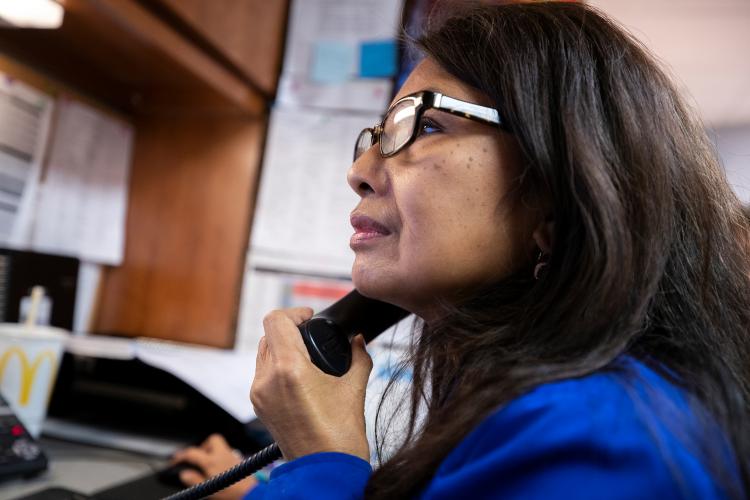
Patients never see their faces. But they play a key role in helping people who need surgery get care at JPS Health Network.
Called patient care coordinators, their job is what the title implies: They’re responsible for choreographing the complicated ballet of making about 1,000 surgeries a month fit into the 13 operating rooms at JPS.
“Their work is invaluable,” said Dr. Carlos Rodriguez, a general surgeon who operates at JPS. “We literally could not operate without their assistance. They are constantly juggling the operative schedule to allow for optimal utilization of time. It’s a demanding job and they handle it skillfully.”
Rodriguez said he is grateful for the small group of nurses who work inside an out of the way office on the second floor of the Outpatient Clinic Building. They play a vital role in making sure people who need surgery get taken care of as soon as possible and, by handling all details large and small, they allow surgeons to focus on the big job of fixing bodies.
Coordinators are constantly getting surgery orders from the doctors they assist. They have to act quickly to keep the schedule moving. Then they have to check back on the cases repeatedly, making sure pre-op procedures are being handled on time.
“There are a lot of things that factor into it when surgeries are scheduled,” said patient care coordinator Teresa Dekleva. “It’s not just filling up the time slots. There are a lot of phone calls that happen to make sure everything that needs to be done before their surgery gets handled when it’s supposed to be done.”
Not only do the surgical suite hours and the schedules of surgeons have to agree, Dekleva said patient care coordinators have to check all the boxes to make sure patients have had all their required testing and preparation for their operation. That can include making sure they have someone in place to help care for them afterwards if they’re not going to be able to take care of themselves, that their financial arrangements are taken care of, even that they still want to get the procedure and plan to show up at the agreed to appointment.
It's really complex to manage so many surgeons and so many patients with limited OR time.
When any of the items on the pre-surgery to-do list don’t get taken care of and an operation is postponed, that’s not only wasted time. It’s a lost opportunity to help someone else. So the patient care coordinators have to make sure all the puzzle pieces fit together just right.
“The patient care coordinators work magic by finding or creating time in the schedule to get patients treated sooner,” said Dr. Fayette Williams, Division of Maxillofacial Oncology & Reconstructive Surgery Director at JPS. “It's really complex to manage so many surgeons and so many patients with limited OR time but they always manage to make things happen.”
Cases range from only minutes for some eye operations to 13-14 hours straight for a surgery Williams performs to remove a patient’s tibia, turn the straight bone into a horseshoe shape with a series of precise cuts, and use it to replace their lower jawbone.
How do the patient care coordinators anticipate all the needs of surgeons and requirements of patients before they can have an operation? The answer is simple: Through experience. And lots of it.
“I’ve been a nurse for 33 years,” Dekleva said. “I worked at Parkland Hospital in Dallas in labor and delivery and in the operating room. I worked overseas in a primary care setting, working with everyone from adults to infants.”
She came to JPS working in IV sedation and Orthopedics. After three decades as a nurse, she was ready for a change. Once she made the switch, Dekleva said she never looked back. Becoming a patient care coordinator has rejuvenated her career.
“It might seem like a boring job because there is a lot of looking at computer screens and there are a lot of phone calls,” Dekleva said. “But you can tell in the patient’s voice how grateful they are for the help. Knowing that you helped them get the care they needed, that’s what makes me feel good about my job.”
